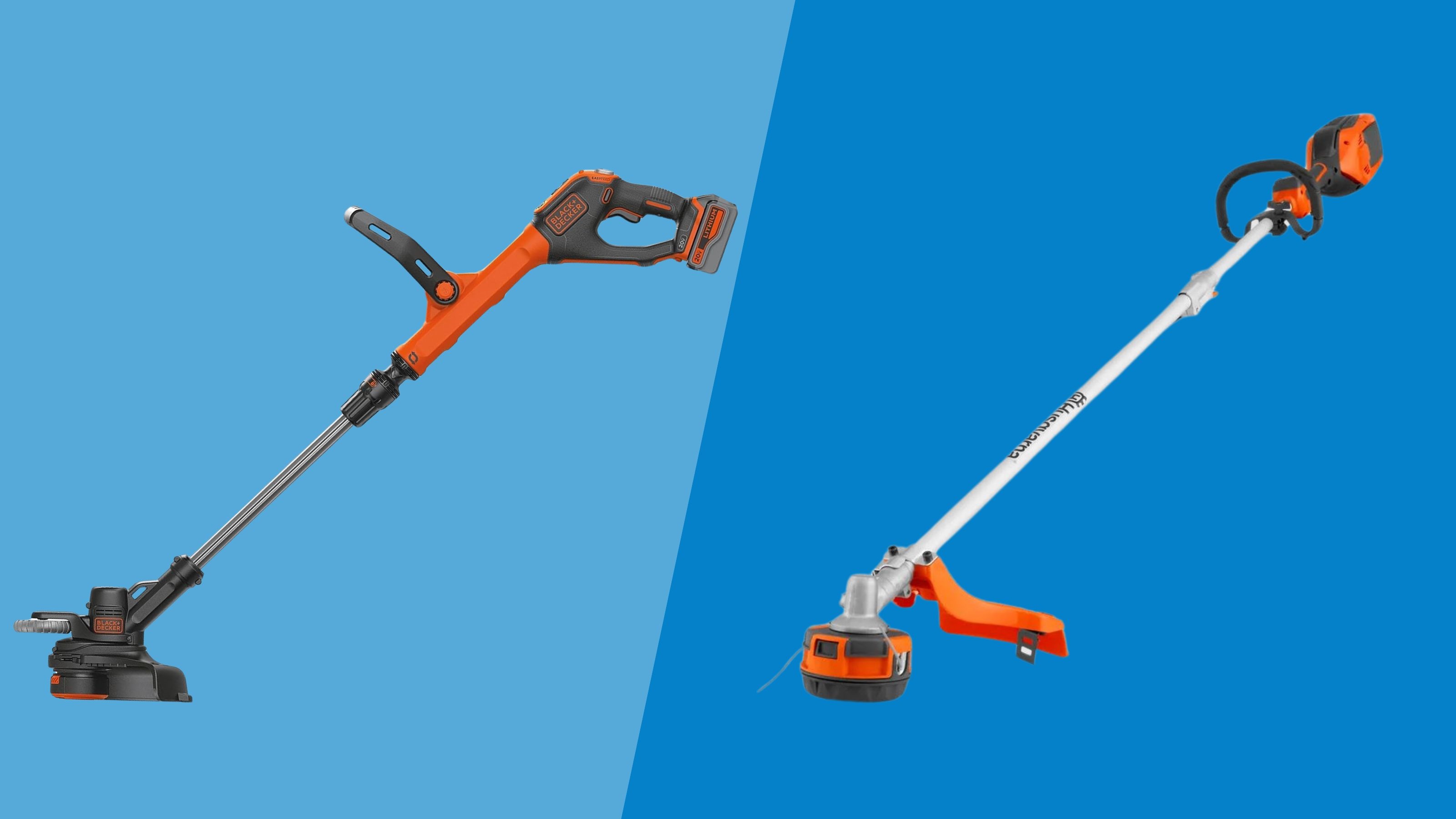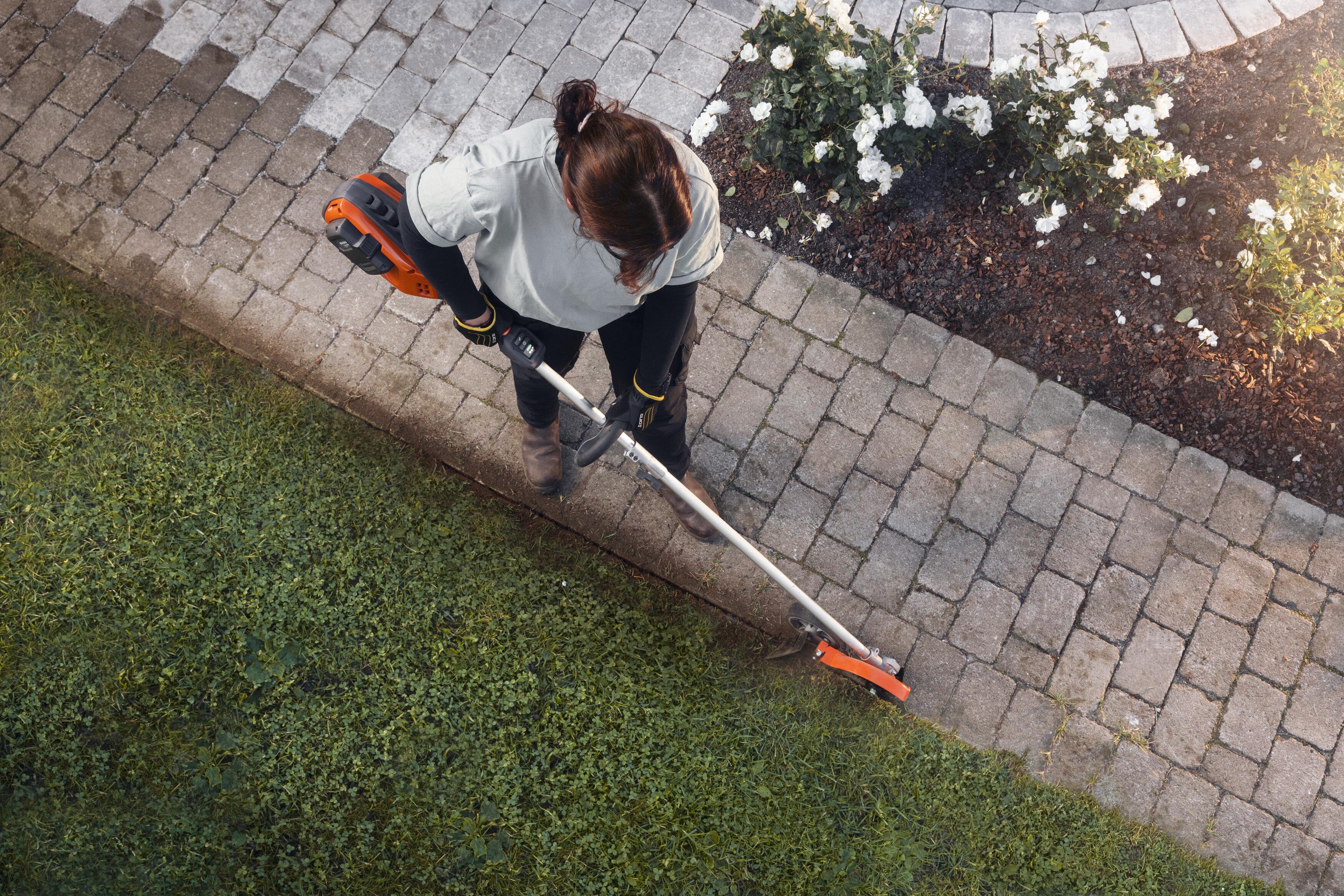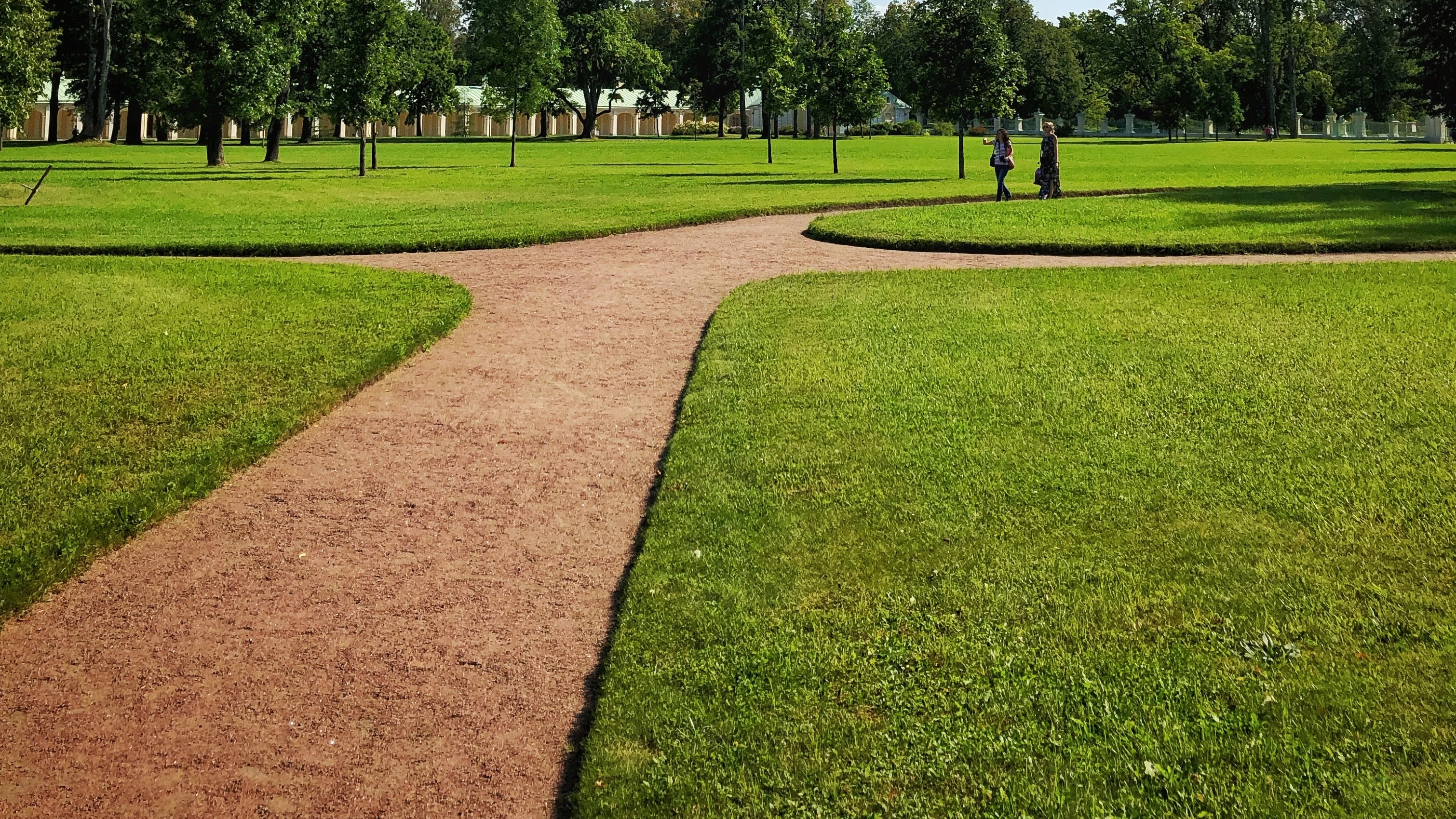
Price: $129.99
Power source: Battery
Dimensions: L74.01 x W7.32 inches
Weight: 5.8 lbs
Our reviewer, Jason Cockerham, loved this string trimmer's user-friendly design, easy storage and powerful grass-trimming and weed-cutting performance. It can be used, with its guide wheel, to edge a lawn – but this tool's at its best when whacking weeds.
For
- Multiple tools in one platform
- Good battery life
- Powerful enough for most lawns
Against
- Can be tricky to switch tools
- Expensive compared to single-use tools
Price: $109.99
Power source: Battery
Dimensions: L41.33 x W9.25 inches
Weight: 5.3 lbs
Powerful, versatile and offering decent runtime via the bundled-in lithium-ion battery, this string trimmer is a great choice for all-round lawn tidying. I found that the guide wheel on the head helps with edging, although the trimmer is at its best when whacking weeds.
For
- Excellent trimming performance
- Lightweight and easy-to-use
- Convenient storage and maintenance
- Intuitive, adaptable design with two speeds and two orientations
Against
- Slow battery charging
- No heavy duty line (HDL) for cutting thick weeds
- Not ideal for very large lawns
String trimmer vs lawn edger—either tool can make your lawn neater and better-looking. So, which one should you choose?
Put simply, it depends which lawn care tasks you need to do. Lawn edgers are the best-suited tool to keep the boundary of your lawn perfectly neat, while the best string trimmers have a range of uses, including cutting soft weeds and mowing long grass in hard-to-mow areas of the lawn.
In this guide, I’ll take you through the key differences between string trimmers and lawn edgers, in terms of their uses, design, features and capabilities. You’ll leave with a better idea of whether to choose a string trimmer or a lawn edger.
Chris Richert, a Product Manager specializing in handheld tools at Husqvarna, will be on hand with some expert insight on the differences between a lawn edger and a string trimmer.
String trimmer vs lawn edger: What's the difference?
There are similarities between string trimmers and lawn edgers. Both are double-handed electric yard tools that typically cut with a rotating attachment (although some lawn edgers are oscillating or manually powered instead). And either can be used to edge a lawn. It’s understandable that some folks get the two types of tool mixed up.
The key difference between a string trimmer and a lawn edger is their purpose. String trimmers cut by spinning a short length of cutting string (also known as ‘line’) at the head of the tool. They can perform various lawn care tasks – but their primary role is horizontally cutting long grasses and soft weeds. Some models feature an adjustable head that can be positioned vertically for lawn edging.
Meanwhile, lawn edgers cut with a vertical metal blade, which can dig powerfully down to grass-root level. They are used especially for edging lawns, as their name would suggest.
You’ll sometimes find a string trimmer or lawn edger with slightly different capabilities. For instance, there are heavier-duty string trimmers, called brushcutters, which can cut harder, woodier weeds.
String trimmer vs lawn edger: Price
Price is one area where string trimmers and lawn edgers have a lot in common. Whichever of the tools you choose, you're looking at spending a little over $100 for a good-quality model, or considerably more for a high-spec or gas-powered option.
Verdict: String trimmers and lawn edgers come at a similar price. However, a string trimmer (like the BLACK+DECKER 20V MAX* String Trimmer / Edger for $119 on Amazon) may offer you better value-for-money, as it caters for a greater variety of use cases—including lawn edging, as well as cutting back weeds and mowing long grass.

String trimmer vs lawn edger: Design & Features
According to Husqvarna’s Chris Richert, a string trimmer will see more use in the average yard than a lawn edger.
“This is because a string trimmer can be used for trimming, but also many people will use it for edging as well by turning the trimmer head. It won’t edge quite as well as a specialized lawn edger, but it will work in a pinch,” he says.
The versatility of certain string trimmer models is made possible by a wide range of features, including adjustable handles, heads and shafts, which can be repositioned to suit your stance and grip. Some models have useful extras such as a guide wheel to help with edging, or a spool that can accept tougher cutting line for use on woody weeds.
Where lawn edgers really come into their own is making the edges of a lawn exceptionally neat. Two crucial components enable this: the metal cutting blade, which cuts through grass and soil efficiently; and a wheeled base, which provides the stability needed to edge in a really straight line. Some models give you fine control over the edging action, with adjustable cutting depth and width settings.
Verdict: In a nutshell, lawn edgers are the best-designed tool you can get specifically for lawn edging, while string trimmers have a more versatile design and feature set.
“Lawn edgers are much better for crisp edges and a well-manicured lawn, if the user wants to be incredibly precise,” says Chris.
“They do a much better job of producing neat lines than a string trimmer could.”
“Meanwhile, a string trimmer is the more versatile and popular pick between the two,” he adds.
String trimmer vs lawn edger: Power & Size
String trimmers and lawn edgers are both powerful types of tool, delivering a forceful cutting action via their string or blade.
These days, most models are powered cordlessly via a lithium-ion battery, which can be recharged and used with other electric lawn tools from the same range. Corded electric models and gas-powered models are also available—as are manual lawn edgers.
Cutting power varies between different models of string trimmer or lawn edger. You’ll need to choose one that suits the scope and intensity of work required on your lawn.
“These tools come with different head sizes and power levels, so depending on how much work you have to do and the size of your lawn, make sure to do your research to pick the right model for your lawn needs,” says Chris.
To compare the power and cutting capabilities of different trimmers or edgers, look for specs appropriate to the design and power source, such as RPM, wattage, cutting width(s) and cubic capacity (cc).
Most string trimmers and edgers have a long handle, allowing people of average height to cut grass at ground level while standing comfortably, holding the tool two-handed. Some models feature a telescopic shaft, which can be extended or retracted to suit your posture.
Whether you choose a trimmer or an edger, it’s worth considering a model’s weight before making your purchase. This can vary greatly, from just a few lbs to 30 lbs or more.
Lawn edgers spend most of their in-use time being pushed along the lawn perimeter, so the ground takes a lot of their weight. Some heavier models have a handlebar, similar to a walk-behind lawnmower.
The typical string trimmer is a different story: you hold it off the ground while cutting weeds and long grass, so you’ll need a model that you can carry comfortably for the duration of the task.
Verdict: Good string trimmers and good lawn edgers will both have enough power for their intended tasks, and a design that’s lightweight enough to handle. Your challenge is to find a model with the right specs to suit your needs.

String trimmer vs lawn edger: Our verdict
As we've seen, lawn edgers and string trimmers have a lot in common. They come in at a similar price, have some similar design DNA, and can sometimes be used for the same tasks (e.g. lawn edging).
For most buyers, I would recommend choosing a string trimmer. This type of tool offers superior versatility, especially if you pick a combi trimmer model, or at least an option featuring a guide wheel to make edging easier.
With that said, if you take immense pride in your perfect lawn, it could be worthwhile to invest in a lawn edger, too. No other tool will give you quite such a neat and immaculate lawn boundary.
String trimmer vs lawn edger: FAQs
Is a string or blade edger best?
A specialized lawn edger will be fitted with a notched metal blade, rather than the cutting string or ‘line’ used with string trimmers.
Unlike cutting string, the metal blade of a lawn edger can cut deep into the turf with ease, which enables the user to cut a clean and distinct boundary line around the edge of the lawn.
If you see a tool with cutting string sold online as an ‘edger’, this is probably just an example of the manufacturer trying to popularize their product on marketplaces such as Amazon. However, there are some ‘combi’ tools out there that can be used with either metal blades or cutting string interchangeably.
Are string trimmers the best tool for edging?
String trimmers are certainly one of the best tools for edging a lawn. However, they are not as well suited to edging as a purpose-made lawn edger tool, which will typically cut turf more powerfully, more evenly, and in a straighter line.
Some string trimmers are better adapted for lawn edging than others. For instance, certain models feature a guide wheel that can be used to steer the string trimmer along the ground while it edges the lawn. And in some cases, you can fit a blade attachment to the head of the tool for a superior edging action.
“In the event of someone owning a combi tool (like the Husqvarna 330iK Combi Switch or 330LK Gas Combi), there is the option to have both trimmer and edger attachments,” says Chris.
“This allows the user to do their trimming with the trimmer attachment, and edge with the edger attachment to accomplish a well-manicured and maintained lawn.”
Can you use a lawn edger to cut weeds and long grass?
Unless you’ve purchased a combi tool, your lawn edger will not be able to safely cut weeds or long grass.
Lawn edgers are designed to cut vertically, not horizontally. Unlike a string trimmer, they lack the safety features, appropriate cutting attachments and ergonomics required to safely cut upright weeds and grasses. If you buy a lawn edger, that’s exactly what you’re getting: a great tool for edging the lawn; no more, no less.







